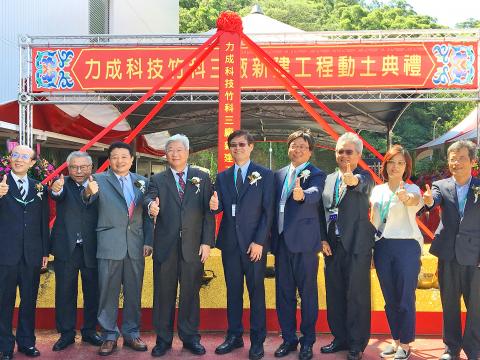Memorychip tester and packager Powertech Technology Inc (力成科技) yesterday said it plans to invest NT$50 billion (US$1.63 billion) in the next five years to build an advanced fab for next-generation packaging technology, catering to growing demand for smaller and energy-saving chips for artificial intelligence, Internet of Things and autonomous vehicle applications.
Fab 3 in Hsinchu Science Park is to be the world’s first fab that commercially uses fan-out panel-level packaging (FOPLP) technology when it starts operations in the second half of 2020, Powertech said.
The announcement comes after Powertech’s major breakthroughs in commercializing the technology since it began secretly investing in it two years ago.

Photo: CNA
“It is becoming increasingly difficult and expensive to shrink transistor [geometry] even smaller ... to keep Moore’s law going,” Powertech chairman D.K. Tsai (蔡篤恭) told a media briefing, referring to an observation that processing power doubles every two years, while costs reduce by half.
“We believe FOPLP technology will be one of the solutions as the technology helps integrate heterogeneous ICs [integrated circuits] in a [smaller] system in an economical way,” Tsai added.
FOPLP technology is more cost-effective, compared with rival fan-out wafer-level packaging, as rectangular panels can be cut into more chips than 12-inch round wafers, Tsai said.
Taiwan Semiconductor Manufacturing Co (TSMC, 台積電) uses fan-out wafer-level packaging.
Asked whether Powertech would directly compete with the world’s biggest contract chipmaker, Powertech chief technology officer David Fang (方力志) said that the company’s targeted customers “might be different from TSMC’s.”
ASE Technology Holding Co (日月光投資控股), the world’s biggest chip tester and packager, has said it is also developing FOPLP technology, but has not provided details.
Fab 3 is to create 3,000 jobs, the company said, adding that it is to have an installed capacity of 50,000 sheets a month, or 150,000 12-inch wafers.
“We have to invest in advanced technologies to support our growth and to survive,” Tsai said.
Fab 3 would satisfy burgeoning demand for new chip packaging technologies in the next decade, Powertech said.
The company plans to use its cash flow to finance construction of the fab, as it had NT$19.88 billion of cash on hand as of June 30.
Providing the company’s business outlook for next quarter, Powertech president Hung Chia-yu said that the fourth quarter would differ from previous years.
“The fourth quarter is usually the strongest season for Powertech, but this year, it will be very similar to the third quarter [in revenue],” Hung said.
Hung attributed the stagnation to customers’ inventory corrections.
Powertech in July and last month saw revenue jump 14.6 percent to NT$12.31 billion, compared with NT$10.75 billion in the same period last year, Taiwan Stock Exchange filings showed.

GROWING OWINGS: While Luxembourg and China swapped the top three spots, the US continued to be the largest exposure for Taiwan for the 41st consecutive quarter The US remained the largest debtor nation to Taiwan’s banking sector for the 41st consecutive quarter at the end of September, after local banks’ exposure to the US market rose more than 2 percent from three months earlier, the central bank said. Exposure to the US increased to US$198.896 billion, up US$4.026 billion, or 2.07 percent, from US$194.87 billion in the previous quarter, data released by the central bank showed on Friday. Of the increase, about US$1.4 billion came from banks’ investments in securitized products and interbank loans in the US, while another US$2.6 billion stemmed from trust assets, including mutual funds,

Micron Memory Taiwan Co (台灣美光), a subsidiary of US memorychip maker Micron Technology Inc, has been granted a NT$4.7 billion (US$149.5 million) subsidy under the Ministry of Economic Affairs A+ Corporate Innovation and R&D Enhancement program, the ministry said yesterday. The US memorychip maker’s program aims to back the development of high-performance and high-bandwidth memory chips with a total budget of NT$11.75 billion, the ministry said. Aside from the government funding, Micron is to inject the remaining investment of NT$7.06 billion as the company applied to participate the government’s Global Innovation Partnership Program to deepen technology cooperation, a ministry official told the

Taiwan Semiconductor Manufacturing Co (TSMC, 台積電), the world’s leading advanced chipmaker, officially began volume production of its 2-nanometer chips in the fourth quarter of this year, according to a recent update on the company’s Web site. The low-key announcement confirms that TSMC, the go-to chipmaker for artificial intelligence (AI) hardware providers Nvidia Corp and iPhone maker Apple Inc, met its original roadmap for the next-generation technology. Production is currently centered at Fab 22 in Kaohsiung, utilizing the company’s first-generation nanosheet transistor technology. The new architecture achieves “full-node strides in performance and power consumption,” TSMC said. The company described the 2nm process as

JOINT EFFORTS: MediaTek would partner with Denso to develop custom chips to support the car-part specialist company’s driver-assist systems in an expanding market MediaTek Inc (聯發科), the world’s largest mobile phone chip designer, yesterday said it is working closely with Japan’s Denso Corp to build a custom automotive system-on-chip (SoC) solution tailored for advanced driver-assistance systems and cockpit systems, adding another customer to its new application-specific IC (ASIC) business. This effort merges Denso’s automotive-grade safety expertise and deep vehicle integration with MediaTek’s technologies cultivated through the development of Media- Tek’s Dimensity AX, leveraging efficient, high-performance SoCs and artificial intelligence (AI) capabilities to offer a scalable, production-ready platform for next-generation driver assistance, the company said in a statement yesterday. “Through this collaboration, we are bringing two